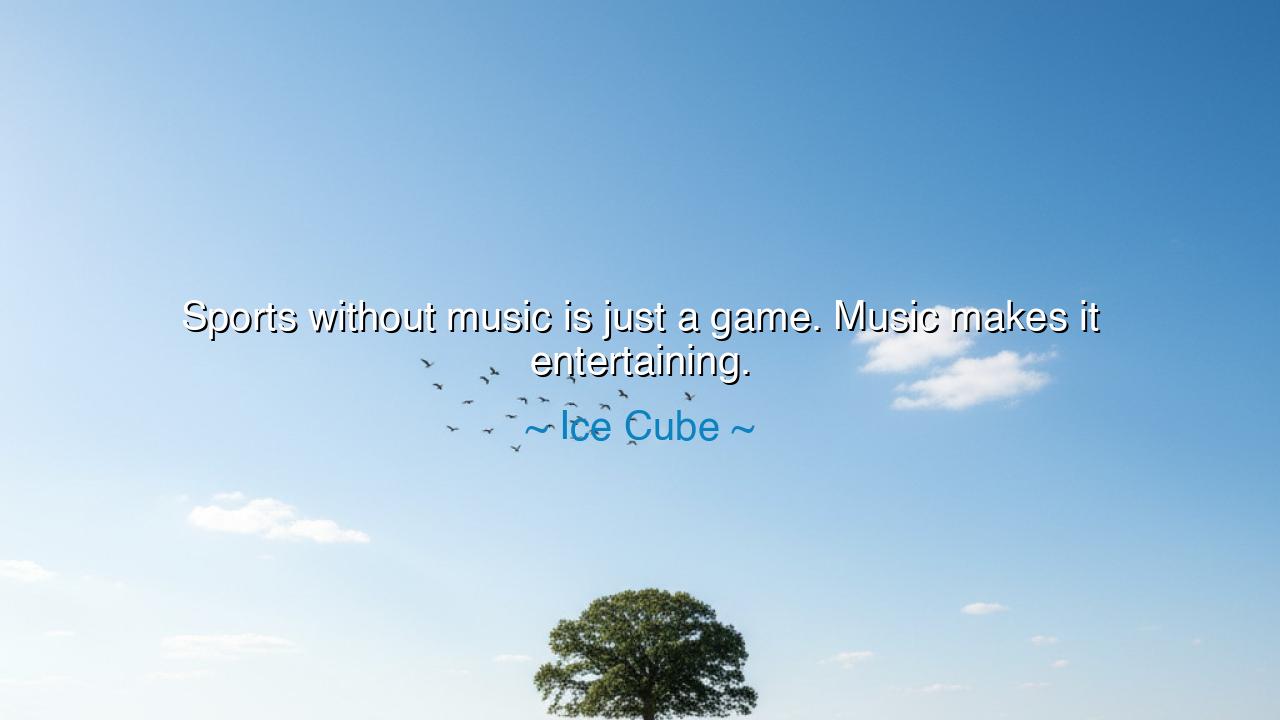
Sports without music is just a game. Music makes it






Ice Cube once declared with clarity and conviction: “Sports without music is just a game. Music makes it entertaining.” Though simple in its phrasing, this saying captures the deep and ancient bond between movement and melody, contest and song. It is not merely about the stadium or the arena, but about the truth that human struggle and triumph reach their fullest meaning when joined with rhythm, sound, and spirit. For without music, the contest is bare; but with it, the game is lifted into celebration, becoming not only a test of skill, but a festival of the soul.
At the heart of these words lies the union of sports and music as two of humanity’s oldest rituals. Both spring from the same roots: the need to express energy, to channel passion, to turn chaos into rhythm. The clash of athletes is itself a kind of music—the pounding of feet, the roar of the crowd, the pulse of the moment. Yet when actual music is woven into the contest, when drums or horns or anthems rise, the struggle is no longer silent labor—it becomes a spectacle that engages not only body and mind, but heart. Ice Cube reminds us that it is this marriage of sound and motion that transforms a game into an experience shared by all.
The ancients knew this truth well. At the Olympic Games of Greece, music was ever-present. Poets sang hymns to the victors, flutes and lyres accompanied parades, and rhythm was used to time the training of runners and rowers. The Greeks believed that athletic excellence without harmony of spirit was incomplete. Likewise, in Rome, the games of the Circus and the Colosseum were never silent; trumpets, chants, and songs filled the air, turning combat and sport into grand theater. Even then, it was known: music amplifies emotion, and emotion gives meaning to competition.
History offers another echo in the tale of Muhammad Ali, who turned to rhythm not only in the ring, but in his very speech. His famous lines—“Float like a butterfly, sting like a bee”—were poetry in motion, music without instruments. His fights became more than contests of strength; they became performances, remembered not only for punches thrown but for the spirit that surrounded them. The chants of crowds, the rhythms of his words, the music of his time—all together made his sporting life a cultural symphony.
Ice Cube, himself a master of rhythm and voice, speaks from this heritage. As a creator of music, he knows that sound has the power to shape atmosphere, to lift the spirit of fans, to focus the mind of players, to make each moment more alive. In his words, we hear the wisdom of one who has walked both worlds: the world of music and the world of sport. And he reveals to us that the two are not separate, but partners in giving meaning to human expression.
The lesson is clear: do not strip your contests, your struggles, or your victories of music. Let rhythm accompany your journey, whether in training, in striving, or in triumph. For music has always been the companion of human effort—it motivates the runner, steadies the worker, inspires the warrior, and unites the crowd. Where silence may make labor heavy, song makes it light. Where silence may leave triumph unnoticed, music makes it unforgettable.
So I say to you: remember Ice Cube’s wisdom. Fill your life’s struggles with music, so that they may not be empty toil but living art. Whether you are on the field of sports or on the battlefield of life, let music be your ally. For in its rhythms you will find energy, in its melodies you will find courage, and in its harmonies you will find joy. And then your life, like the game, will not be just a contest—but a celebration worthy of memory, a story worthy of song.






AAdministratorAdministrator
Welcome, honored guests. Please leave a comment, we will respond soon